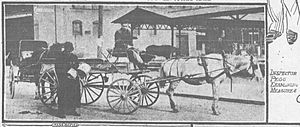John Grant Pegg facts for kids
Quick facts for kids
John Grant Pegg
|
|
|---|---|

Inspecting measures in 1910
|
|
| Born | 1868 |
| Died | August 3, 1916 (aged 47–48) Omaha, Nebraska, US
|
| Occupation | Inspector of Weights and Measures |
| Political party | Republican |
| Spouse(s) | Mary Page |
| Religion | African Methodist Episcopal Church |
John Grant Pegg (1868-1916) was an important leader in Omaha, Nebraska. He was a key figure in the local African-American community. From 1906 until his death in 1916, he worked as the city's inspector of weights and measures. This job made sure that scales and measuring tools used in stores were fair and accurate.
Contents
About John Grant Pegg's Life
John Grant Pegg was born in South Carolina in 1868. When he was a boy, his family moved to Kansas, where he went to school. As the oldest child, he started working early to help his family. For a while, he worked on trains as a porter in dining cars.
In 1899, John Pegg married Mary Page in Topeka, Kansas. They had five children: Mary, James, John, Ruth, and Gaitha.
In Omaha, John Pegg was part of several important community groups. He was a member of the Masons, which is a fraternal organization. He also belonged to the First African Methodist Church. He was a leader in the Omaha branch of the Knights and Daughters of Tabor, another community organization.
John Grant Pegg became very ill in 1916 and passed away at his home in Omaha on August 3, 1916.
John Grant Pegg's Career and Public Service
John Grant Pegg became interested in politics in the late 1880s. While living in Kansas in 1888, he was an officer in a Republican Club for African Americans.
Working in Omaha's Government
In 1899, he moved to Omaha, Nebraska. There, he quickly became involved in local politics. He also became a respected leader in Omaha's black community. In the early 1900s, Pegg was the president of the Colored Men's Roosevelt Club in Omaha. This group supported Theodore Roosevelt and worked for the rights of African Americans.
John Pegg also held important jobs in the city government. From 1901 to 1906, he worked as a messenger for Omaha's Republican Mayor, Frank E. Moore. After Mayor Moore passed away in 1906, the new mayor, James C. Dahlman, chose John Pegg for a new role. He was appointed as the city's inspector of weights and measures.
This was a very important job. As inspector, John Pegg made sure that businesses used correct scales and measurements. This protected customers from being cheated. He was highly respected in this role. In 1913, he even worked to create a state inspector position. This would help small towns that didn't have their own inspectors.
Community Leadership and Activism
As John Pegg's role in city government grew, so did his leadership in the community. In 1907, he was president of the People's Mutual Interest Club. This group included many important black citizens in Omaha. He also became chairman of the executive committee for the larger association that included branches in other states.
In 1908, John Pegg attended the Republican National Convention. This is where the Republican Party chooses its candidate for president. He worked there as a page and doorkeeper. Later that year, he was elected president of the Interstate Literary Association of Kansas and the West.
John Pegg was a strong voice against unfair laws. In 1911, he led a group of ten black leaders from Omaha to speak out against a "Jim Crow" bill. These laws aimed to separate people by race and were very unfair. Thanks to Pegg and his group, the bill was stopped. He also worked with other leaders to make sure African Americans had fair chances for jobs in local government.
Pegg was also a leader in the Negro Woman's Christian Association. He chaired a committee that ran a home for elderly people. In 1916, he was elected chairman of the Western States Negro Republican Convention, a big meeting of black Republicans. He passed away unexpectedly later that year.
 | Laphonza Butler |
 | Daisy Bates |
 | Elizabeth Piper Ensley |

